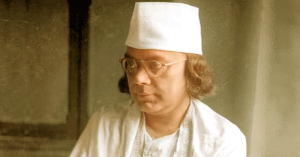একদম শেষে কয়েক লাইন বাংলা সিনেমার জন্য রাখব, হ্যাঁ?
দরজা
শব্দ একটা দরজা। সেই দরজা দিয়ে ঢুকে মানুষের ঘর। এতকালের। সেই ঘর ভাষা।
শব্দ একটা সংকেত। সংকেত যে কোনও ভাষা নির্মাণ করে। সংকেত দিয়েই চেনাচিনি।
সংকেত আছে ছবি আকারে। সোজা, লম্বা, গোল, বাঁকা বিভিন্ন রেখায় আছে। সেই সব জুড়ে জুড়ে শব্দ হয়, ছবি হয়, সিনেমা হয়।
‘‘Words and images intermingle constantly. […] Why are there so many signs everywhere so that I end up wondering what language is about, signs with so many different meanings, that reality becomes obscure when it should stand out clearly from what is imaginary?’’— (গদার ১৯৭৫-এ)
ফ্রান্স
এর পরে সিনেমা যা হবে তাই হয়েছে। এর আগে সিনেমা কী হবে কেন হবে অনেক অন্তহীন কথা সব!
‘‘The cinema is quite simply becoming a means of expression, just as all the other arts have before it, and in particular painting and the novel. After having been successively a fairground attraction, an amusement analogous to boulevard theatre, or a means of preserving the images of an era, it is gradually becoming a language. By language, I mean a form in which and by which an artist can express his thoughts, however abstract they may be, or translate his obsessions exactly as he does in a contemporary essay or novel. That is why I would like to call this new age of cinema the age of “caméra-stylo”.—(আলেক্সান্ডার আস্ত্রুক ১৯৪৮-এ)
ভাষা। রেলগাড়িটা স্টেশনে এসে ঢুকল। দাঁড়াল। ফিল্ম ক্যামেরা চলছে। ল্যুমিয়েররা ছাপ নিচ্ছে আলোর প্রতিফলনের। আমি দেখলাম। প্রতিদিন আমি দেখেছি এমন হাওড়া স্টেশনে, যে কোনও রেলের স্টেশনে। তাতে কী? কী দেখলাম? রেলগাড়ি? রেলগাড়ির ছায়াচিত্র? লোকগুলো কেমন বর্ণে, ঢঙে ঢেউ হয়ে যাচ্ছে হাঁটা দিয়েই? এই যে বললাম হাঁটা দিয়েই ঢেউ হয়ে যাচ্ছে, মানুষ হয় নাকি এমন ঢেউ? এ কি বাস্তব? অধি বা পরাবাস্তব? বস্তু কি আছে এতে? আমার ইন্টারপ্রিটেশন? আমারই? নাকি আপনারও? যদি আপনার না হয় তা হলে তিনি মেলাবেন কী করে, যিনি মেলাবেন আমাদের মেলাবেন?
মাথার উপরে ফ্যান ঘুরছে। ফ্যান। ব্লেড আছে। খুলে যেতে পারে যে কোনও মুহূর্তে। টেকনিক্যাল ফল্ট! লুই আর তার বউ যাচ্ছে ওই! ওদের গিলোটিনে চড়ানো হবে। হুঁশিয়ার রাজাদের দল! গিলোটিনের ধারালো ব্লেড কেটে ফেলবে মুণ্ডু। ঘুরন্ত দুরন্ত ফ্যানের ব্লেড-ও পারে। শ্রমিকের হাতের আঙুল কাটে কারখানায় গত কয়েক শতাব্দী ধরে। এখানে আমাকে হাওয়ায় আরাম দিচ্ছে গরমে। কেটে গেলে? বাস্তব কোনটা? আরাম নাকি আমার এই মৃত্যুর সঙ্গে ঘনিষ্ঠ বসবাস?
সাউন্ডট্র্যাকে গদারের গলা:
But where to begin? But where to begin with what?… We could say that the limits of language are the limits of the world… that the limits of my language are the limits of my world. And in that respect, I limit the world, I decide its boundaries. (Two or three things I know about her-১৯৬৬)
আমেরিকা
“But is France living in the past? Have the French lost their position as artistic leaders of the film world, their cinematic tradition slowly but surely losing its luster?”
“Commercially speaking, the data is unambiguous. In 2004, six out of the 10 highest-grossing films in France were American, slightly down from seven in 2003 and eight in 2002. The single most successful film in France in 2004,”
“Les Choristes, released Jan. 14 in selected American cities as The Chorus and nominated this week for best foreign film and best song Oscars. Its hometown success is significant, as The Chorus is the rare recent French film that has more than held its own against an endless Hollywood invasion.”—(জন ফ্রসচ, ২০০৫, ফ্রিল্যান্স সাংবাদিক, সিনে সমালোচক)
এটা ১৯৪৯-র La Cage aux Rossignols রিমেক। বদ ছেলে-পুলে, সহানুভূতিশীল তন্বী শিক্ষিকা, ছেলেদের পালটে সব দেবদূতে পরিণত হওয়া তার প্রেরণায়। ন্যাকা-বোকা এবং স্রেফ কমার্সিয়াল গ্যাঁজলা।
“The film’s success can be explained away by the presence of an immensely likeable lead actor, Gérard Jugnot, an undemanding storyline fit for viewers of all ages, and an easy-to-swallow message: that inside every surly misfit is a gift waiting to be coaxed out. More bothersome than the film’s self-congratulatory moralism, however, is the bland, manufactured quality of the film-making. One gets the feeling, while watching The Chorus, that it might as well not be a French film at all, that the same movie could have been made by a Hollywood studio.” –(জন ফ্রসচ, ২০০৫, ফ্রিল্যান্স সাংবাদিক, সিনে সমালোচক)
শাহরুখ খান, অমিতাভ বচ্চন এবং গুরুকুলের ‘মহাব্বতে’-র উৎপত্তি সিনেমা এই দুটি। সমালোচনার জন্য শুধু বলি ওই ওই।

সিনেমার ভাষা এর পরেও আমেরিকায়? কী নেই? গপ্পো, অভিনয়, ক্যামেরা, গুচ্ছ টাকা। সিনেমা কই? কেন এই প্রশ্ন?
খোকাবাবু যায়, লাল জামা গায়…
ফ্ল্যাহার্টি নানুক অফ দ্য নর্থ বানিয়েছিলেন। তথ্যচিত্র। আলাস্কার নানুকের জীবন নিয়ে। তত্ত্বের কাজে লাগাতে। নৃতাত্ত্বিক, ব্যবহারগত বৈশিষ্ট্য জানতে। গদারের মতে এটা একধরনের সিনেমা। অন্যটা আইজেনস্টাইন। গ্র্যান্ড থিয়েটার। ওডেসা-র জাহাজ। ব্যাটলশিপ পোটেমকিন। সেই সিঁড়িটা দিয়ে হাজারে হাজারে ওঠা-নামা করে। ধ্বনি, ছবি সব মিশে যায়। তথ্যচিত্র থেকেও যাওয়া যায় থিয়েটারে। থিয়েটার থেকেও আসা যায় তথ্যচিত্রে।
ফল, চরমে অ্যালা রেসনেইস, ক্রিস মার্কে। মাঝখানে গদার। সিনেমাগুলোতে তথ্যচিত্র, কাহিনি, সাংবাদিকতা, মন্তব্য, সমালোচনা, আড্ডা যে যেখানে পেরেছে জুড়ে বসেছে। প্রবন্ধের ধারকে কিছুটা জলরঙে চেপে দিয়ে ছেপে দেওয়া।
“The Americans are good at story-telling, the French are not. Flaubert and Proust can’t tell stories. They do something else”—(গদার, নারবনি)
কী সেটা?
“As a critic, I thought of myself as a film-maker. Today I still think of myself as a critic, and in a sense I am, more than ever before. Instead of writing criticism, I make a film, but the critical dimension is subsumed. I think of myself as an essayist, producing essays in novel form, or novels in essay form: only instead of writing, I film them. Were the cinema to disappear, I would simply accept the inevitable and turn to television; were television to disappear, I would revert to pencil and paper. For there is a clear continuity between all forms of expression. It’s all one. The important thing is to approach it from the side which suits you best”—(গদার, নারবনি)
ঋত্ত্বিক ঘটক। যুক্তি-তক্কো আর গপ্পো।
বাস্তব
সমালোচক: কেন একটা হিরোশিমা মন আমুর বা একটা লাভেঞ্চুরা হয় না আমেরিকায়?
দার্শনিক: “Hiroshima” is inconceivable in America because there is not enough plot, L’Avventura because the plot makes no sense”.
অ্যান্ড্রু সারিস-এর ‘মুসমান’ থেকে নিয়ে নিলাম আমার ইচ্ছে মত ঢঙে!
আইডিয়া থেকে আসে ইমেজ। ইমেজ থেকে আইডিয়া না। এম্পিরিক্যাল কালেকশন থেকে তত্ত্ব শুধু না তত্ত্বর ফলিত চেহারাকে দেখার চেষ্টা। আমেরিকায় ইমেজ থেকে আইডিয়া আসতে চায়। সিনেমায় ছবি না শব্দ কোনটা গুরুত্বপূর্ণ এটা একটা বেকার তর্ক। সকলের আগে আইডিয়া। সেই অনুযায়ী যা যা লাগবে তা তা।
তাকে এবারে ধাপে ধাপে রুমাল বের করার কাহিনি বানালে তাই। তাকে ধারালো করে ভাবাতে বাধ্য করলে তাই। লোকে দেখবে বলে শুধু কাহিনি বানালে ভাষা-টাষা নিয়ে কথা বলে লাভ নেই। সিনেমা বানালে এসব নিয়ে কথা হবে-টবে।
“Intelligence is to understand before affirming. It means that when confronted with an idea, one seeks to go beyond it… To find its limits, to find its opposite… […] the essence of the paradox is, in the face of what seems a perfectly self-evident idea, to look for the opposite” (গদার, ১৯৭৫)
এই সব জন্ম দেবে দৃশ্যের, কাব্যের, প্রবন্ধের তুখোড় বজ্জাতির। প্যারাডক্সিক্যাল দেখাদেখি হবে। ডিম আগে না মুরগি আগে?
“To keep the natural beauty of real light on the screen, whatever movements Anna Karina and Belmondo may make around the room in “Pierrot le Fou” – that’s the cameraman’s job. That is what Godard was asking for when he said, in his usual hesitant way, “Monsieur, we are going to be simple”. Godard himself isn’t exactly simple. […] He wants to shoot without lights: he’s thinking of a shot in a Lang film which he saw six months ago, and of the left half of a shot by Renoir… he’s no longer sure which one, and he can’t really explain any further, but really it wasn’t at all bad. Then after having told me this, he sends me off the set, me and everyone else, while he thinks about the way he’s going to do it. And when I come back, I find that it’s no longer the same shot. And anyway, he would rather like that very white light which lit up the end of a table in a shot (unhappily a very short shot) from a Griffith film, and he has always wondered whether perhaps that very white light didn’t really come from the developing processes used in the Griffith laboratories, which must have been quite different from any other… and so on, and so on. No, Godard isn’t simple” (রাউল কোতার্দ, গদারের সিনেমাটোগ্রাফার বলছেন অ্যান্ড্রু সারিসকে, মুসমান)
পেডার গ্রোংগার্ড এই সব তুলে এনেছেন তাঁর প্রবন্ধ ‘একটা দুটো জিনিস যা আমি জানি ইউরোপ কিম্বা আমেরিকার সিনেমা সম্পর্কে’ প্রবন্ধে। এই সকল কথা কিছু কিছু ফিল্ম নয়ারের কথা, সিনেমা বিষয়ক সিনেমার কথা এবং কাটাকাটি। বড় বড় দাদা-দিদিরা আমাদের খোকাবাবুদের দিকে চেয়ে থেকেই চোখ নষ্ট করে ফেলেছে। গদারের নষ্ট আখ্যান তাদের কাছে খুব ভারি। ঋত্বিক, সত্যজিৎ বিগত। মৃণাল এখন কাজের বাইরে। বাকি পাখি সব করে রব, কিন্তু রাতি পোহায় না।













